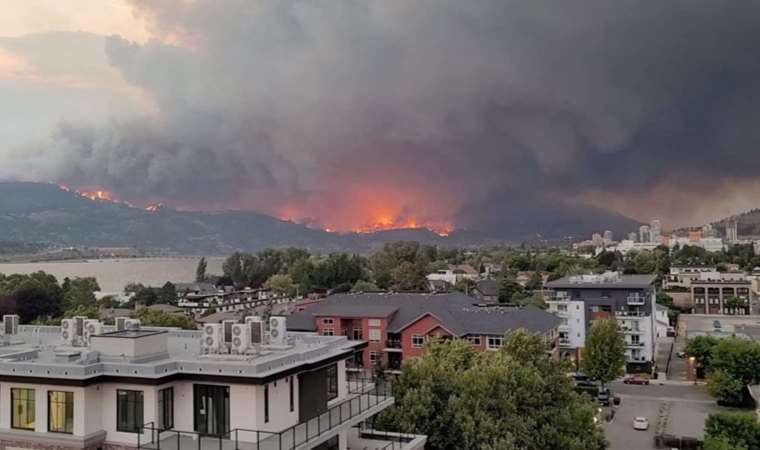20,000 Yellowknife residents evacuated due to wildfire in Canada
Canadian fire crews on Thursday battled to prevent wildfires from reaching the northern city of Yellowknife, where all 20,000 residents are leaving by car and plane after an evacuation order was declared.

Water bombers flew low over Yellowknife as thick smoke blanketed the capital of the vast and sparsely populated Northwest Territories. Officials say the fire, which is moving slowly, is now 15 km (10 miles) northwest of the city and could reach the outskirts by Saturday if there is no rain.
"Very tough days ahead – with two days of northwest to west-northwest winds on Friday and Saturday, which would push fire towards Yellowknife," the territorial fire service said in a statement on Facebook.
In the Pacific province of British Columbia, which has suffered unusually intense blazes this year, officials warned residents to prepare for extreme fire conditions.
"This weather event has the potential to be the most challenging 24 to 48 hours of the summer from a fire perspective," wildfire service director Cliff Chapman told reporters. "We are expecting significant growth and we are expecting our resources to be challenged from north to south."
In Yellowknife, hundreds of people lined up outside a local high school waiting to be taken to the airport for one of the five evacuation flights planned on Thursday to the neighboring province of Alberta.
Prime Minister Justin Trudeau convened a meeting of the Incident Response Group to discuss the fires on Thursday. The group is comprised of senior officials and ministers and meets in cases of crisis.
Defence Minister Bill Blair, speaking to the Canadian Broadcasting Corp (CBC) after the meeting, said the federal government was closely monitoring the evacuations and was prepared to quickly airlift residents if land routes get cut off.
This is Canada's worst-ever wildfire season with more than 1,000 active fires burning across the country, including 265 in the Northwest Territories. Experts say climate change has exacerbated the wildfire problem.
Drought has been a contributing factor to the number and intensity of this year's fires, officials say, with high temperatures exacerbating the situation. Much of Canada has seen abnormally dry conditions.
Shane Thompson, the territorial environment minister, said the evacuation order had been issued late Wednesday to give people time to get out before the weather turned bad.
"The urgency is, fire changes drastically ... the conditions are in our favor right now, but that will change on Saturday," he told the CBC.
In total, about 65% of the Territories population of 46,000 people would be evacuated, he said.
The Northwest Territories have limited infrastructure and there is only one two-lane road out of Yellowknife to the province of Alberta to the south.
Alberta has set up three official evacuee reception centers for those leaving by road but the closest is more than 1,100 km (680 miles) from Yellowknife.
The deadline for residents to leave Yellowknife is noon on Friday (1800 GMT).
Yellowknife Mayor Rebecca Alty said special teams were clear-cutting trees close to the city in an effort to prevent flames from spreading. They also planned to use fire retardant while ensuring sprinkler systems are working, she told the CBC.
Canada's two largest airlines said they were adding flights from Yellowknife and capping fares following outrage on social media about some soaring prices.
Some of the evacuees will be flown to Calgary, in Alberta. Iain Bushell, Calgary's emergency management director, said the city could accommodate and feed 5,000 people.
"We are prepared to house them and help them for as long as they need," he told a televised briefing.
In a social media post, the Northwest Territories fire service said a fire that had been threatening Hay River, a community of some 3,000 further south on Great Slave Lake, had stalled overnight.
So far about 134,000 square km (52,000 square miles) of land in Canada have been scorched, more than six times a 10-year average. Nearly 200,000 people have been forced to evacuate at some point this season.
"The territories have never seen anything like this before in terms of wildfire ... it's an unimaginable situation for so many," Mike Westwick, the territories' fire information officer, told the CBC.
The blazes have also affected industrial and energy production. Diamond producer De Beers said in a statement that its Gahcho Kue mine, some 280 km (170 miles) northeast of Yellowknife, continued to operate although a number of employees from surrounding communities had been evacuated.
In May 2016, a huge fire destroyed 10% of structures in the northern energy-producing Alberta city of Fort McMurray, forcing the evacuation of 90,000 residents and shutting in more than a million barrels per day of oil output.
In June 2021, 90% of the structures in the British Columbia village of Lytton burned down, a day after it recorded Canada's hottest-ever temperature
Since 2009, Canada has been spending more on fighting and suppressing wildfires than on maintaining its firefighting personnel and program.
